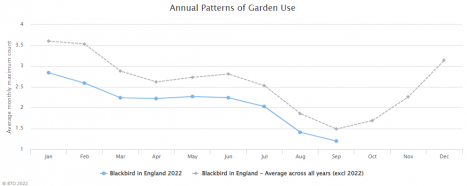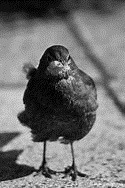As a birdwatcher, one of the most frequently asked questions directed at me at this time of the year is “Where have all the birds gone? My garden’s empty!”. The standard response is always twofold: there is plenty of food for birds in the wider countryside, so they aren’t so dependent on gardens, and many of them are moulting all their feathers so they make themselves scarce – and safe from sparrowhawks – by skulking out of sight in the shrubbery.
Just to prove the accuracy of my wise words, data from more than 22,000 garden birdwatchers who participate in the British Trust for Ornithology’s (BTO) Garden Birdwatch survey for one of our commonest garden birds, the blackbird, is shown in this graph.

As I’m writing this in the middle of September, it appears this year’s sightings have been consistently below the average for the previous twenty-six years. This could be explained by two things. The most obvious reason this year is the extreme heat we’ve experienced which has baked the ground and made it harder for blackbirds to find the worms they need to feed their young, so many fewer chicks survived.
Could the second reason be that gardens are becoming less nature-friendly? There are many reasons this might be the case: understandably, the average size is possibly getting smaller to accommodate more new houses per hectare and more front gardens are disappearing under concrete for cars. Another could be the perverse proliferation of plastic lawns. Why move to the country and cover your tiny part of it with plastic, then be persuaded to pay a small fortune for chemicals to clean it of dog, cat and fox (but sadly not many bird) droppings?
Back to blackbirds. The graph suggests I might have just one in my garden. But I am regularly counting four or five, some mornings. Again, the explanation for this could be twofold. The heat that probably contributed to fewer chicks fledging also ripened wild berries earlier – there certainly appear fewer than usual about in my neck of the woods. And, if they do need to turn to my garden for an easy meal, they have my crop of autumn-fruiting raspberries awaiting them. All the hard work carting bowls of dirty washing-up water out to the vegetable garden paid a handsome dividend in tomatoes, courgettes, and French beans – and now in raspberries. And in their egalitarian world the blackbirds are making off with their share!
I should be pleased. And yet? I know. I’ll put in plastic raspberries.







Make A Comment
Comments (0)